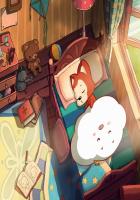At first he had let himself do this much less often than he would have liked, for the shyness of years, his over-sensitive modesty at his own want of charm and lightness, was a self-erected barrier in his way. He was, in spite of his intimacy with Hermann, desperately afraid of being tiresome, of checking by his presence, as he had so often felt himself do before, the ease and high spirits of others. But by degrees this broke down; he realised that he was now among those with whom he had that kinship of the mind and of tastes which makes the foundation on which friendship, and whatever friendship may ripen into, is securely built. Never did the simplicity and sincerity of their welcome fail; the cordiality which greeted him was always his; he felt that it was intended that he should be at home there just as much as he cared to be.
The six working days of the week, however, were as a rule too full both for the Falbes and for Michael to do more than have, apart from the music lessons, flying glimpses of each other; for the day was taken up with work, concerts and opera occurred often in the evening, and the shuttles of London took their threads in divergent directions. But on Sunday the house at Maidstone Crescent ceased, as Hermann said, to be a junction, and became a temporary terminus.
"We burst from our chrysalis, in fact," he said. "If you find it clearer to understand this way, we burst from our chrysalis and become a caterpillar. Do chrysalides become caterpillars! We do, anyhow. If you come about eight you will find food; if you come later you will also find food of a sketchier kind. People have a habit of dropping in on Sunday evening. There's music if anyone feels inclined to make any, and if they don't they are made to.
Some people come early, others late, and they stop to breakfast if they wish. It's a gaudeamus, you know, a jolly, a jamboree. One has to relax sometimes."Michael felt all his old unfitness for dreadful crowds return to him.
"Oh, I'm so bad at that sort of thing," he said. "I am a frightful kill-joy, Hermann."Hermann sat down on the treble part of his piano.
"That's the most conceited thing I've heard you say yet," he remarked. "Nobody will pay any attention to you; you won't kill anybody's joy. Also it's rather rude of you.""I didn't mean to be rude," said Michael.
"Then we must suppose you were rude by accident. That is the worst sort of rudeness.""I'm sorry; I'll come," said Michael.
"That's right. You might even find yourself enjoying it by accident, you know. If you don't, you can go away. There's music;Sylvia sings quite seriously sometimes, and other people sing or bring violins, and those who don't like it, talk--and then we get less serious. Have a try, Michael. See if you can't be less serious, too."Michael slipped despairingly from his seat.
"If only I knew how!" he said. "I believe my nurse never taught me to play, only to remember that I was a little gentleman. All the same, when I am with you, or with my cousin Francis, I can manage it to a certain extent."Falbe looked at him encouragingly.
"Oh, you're getting on," he said. "You take yourself more for granted than you used to. I remember you when you used to be polite on purpose. It's doing things on purpose that makes one serious. If you ever play the fool on purpose, you instantly cease playing the fool.""Is that it?" said Michael.
"Yes, of course. So come on Sunday, and forget all about it, except coming. And now, do you mind going away? I want to put in a couple of hours before lunch. You know what to practise till Tuesday, don't you?"That was the first Sunday evening that Michael had spent with his friends; after that, up till this present date in November, he had not missed a single one of those gatherings. They consisted almost entirely of men, and of the men there were many types, and many ages. Actors and artists, musicians and authors were indiscriminately mingled; it was the strangest conglomeration of diverse interests. But one interest, so it seemed to Michael, bound them all together; they were all doing in their different lives the things they most delighted in doing. There was the key that unlocked all the locks--namely, the enjoyment that inspired their work. The freemasonry of art and the freemasonry of the eager mind that looks out without verdict, but with only expectation and delight in experiment, passed like an open secret among them, secret because none spoke of it, open because it was so transparently obvious. And since this was so, every member of that heterogeneous community had a respect for his companions; the fact that they were there together showed that they had all passed this initiation, and knew what for them life meant.
Very soon after dinner all sitting accommodation, other than the floor, was occupied; but then the floor held the later comers, and the smoke from many cigarettes and the babble of many voices made a constantly-ascending incense before the altar dedicated to the gods that inspire all enjoyable endeavour. Then Sylvia sang, and both those who cared to hear exquisite singing and those who did not were alike silent, for this was a prayer to the gods they all worshipped; and Falbe played, and there was a quartet of strings.
After that less serious affairs held the rooms; an eminent actor was pleased to parody another eminent actor who was also present.
This led to a scene in which each caricatured the other, and a French poet did gymnastic feats on the floor and upset a tray of soda-water, and a German conductor fluffed out his hair and died like Marguerite. And when in the earlier hours of the morning part of the guests had gone away, and part were broiling ham in the kitchen, Sylvia sang again, quite seriously, and Michael, in Hermann's absence, volunteered to play her accompaniment for her.















